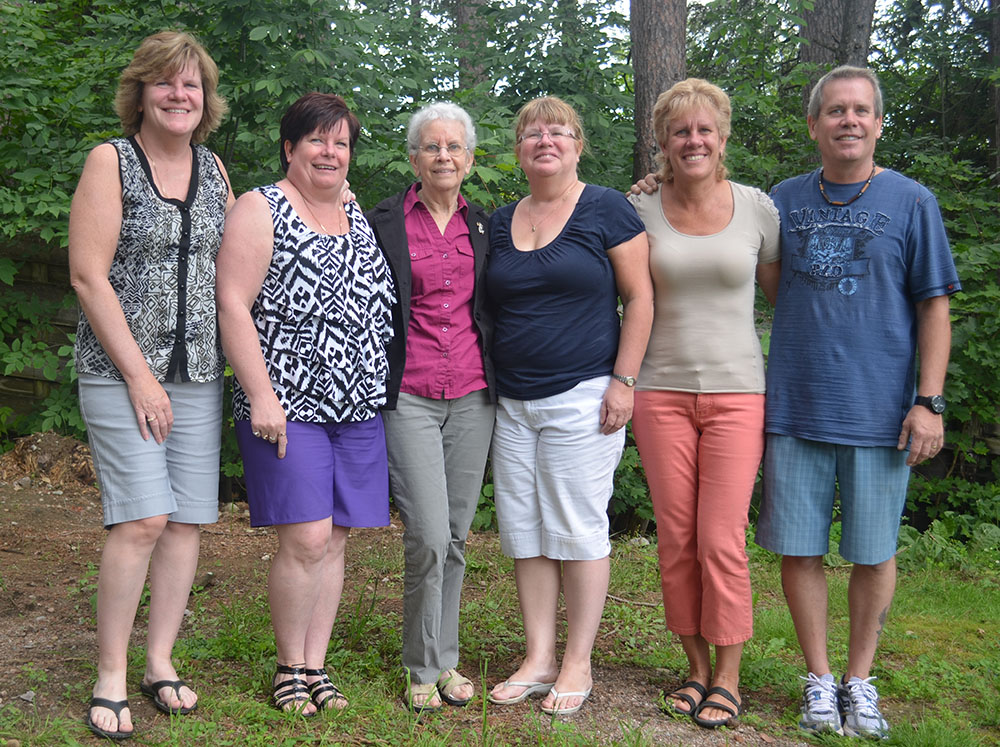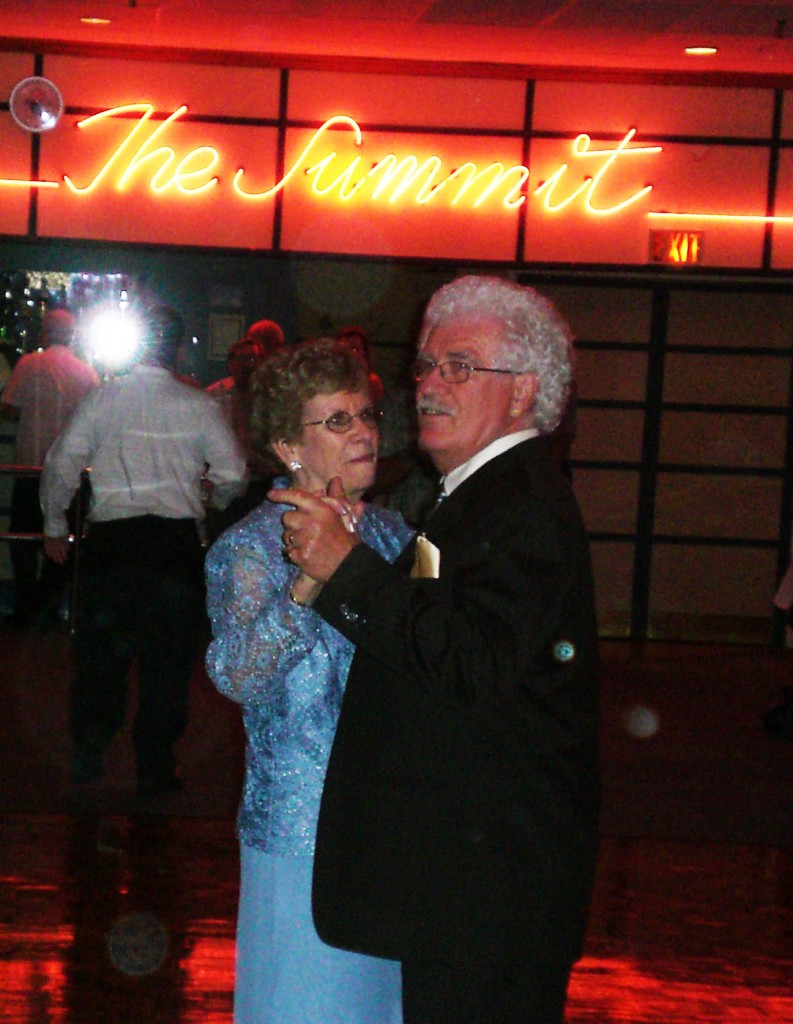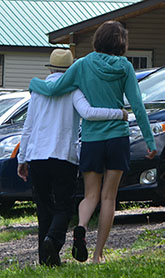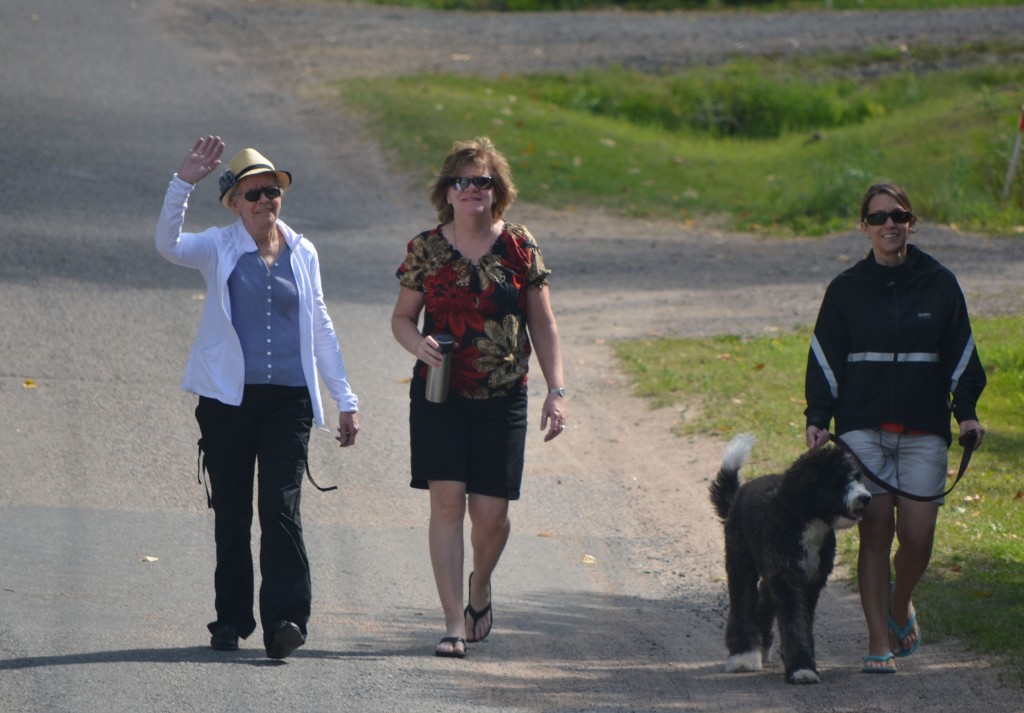Better, you think, to be given six months to live, or to die instantly?
Not the type of question that is generally resolved around the lunchroom table at work. And it’s hardly a philosophical debate to be squeezed into the commercial breaks of the Sunday afternoon football line-up. But, it is a consideration that forces its way into the consciousness of a family having experienced both sides of the equation in a period of just a few years.
**************************************************
The news came out of the blue. A mother-in-law, feeling a little off, checks in for routine blood tests in North Bay. Her white cell reading is a bit high. The GP is not overly concerned, but as a precaution, arranges for further testing at a hospital in Sudbury. While admitted, she develops unusual body swelling and a rash. Blood tests show the white cell count has soared to 372 against a normal rating of less than 10. Various drugs and steroids are administered to lower the count. Bone marrow tests are quickly scheduled and conducted. Then the results.
The attending oncologist is reputed to be excellent in the field. He speaks at an extremely quick pace, and he is all business. He is difficult to understand as he speeds through instruction and information. Like most health care professionals these days, he is incredibly busy, lighting at the room for a few minutes, then charging off to his next patient. Bedside manner is not his strong suit, but both patient and family happily accept his experience and credentials over a cheery disposition. Thankfully, pleasant and easily understood nurses are on hand to interpret, elaborate, reassure.

Three days after the bone marrow test, the doctor drops by the private room on his rounds. Jackie, the 73-year-old patient is accompanied by one of her five children who lives nearest, in North Bay. The four others have returned to their homes and jobs in Brampton, Toronto, Whitby, and London, after having spent the weekend with their mother and supporting her through the bone-marrow test she had been so anxious about.
Jackie is petite in stature, 110 pounds at best. She is mild-mannered, but determined. She wants to know her condition. “Did you get the test results back, doctor?” she hazards in the French-accented English, typical of many communities in Northern Ontario. “Yes, and it is not good,” the doctor replied bluntly. “You have a very rare form of cancer. It’s called T-Cell Prolymphocytic Leukemia. It’s very aggressive. There is no cure. Expectation for life is six months with immediate chemotherapy treatments. Without treatment, maybe two weeks.”
In a dizzying 30-second update, Jackie’s world had just changed. And, so too, had that of her family.
**************************************************
The human spirit is resilient. We bounce back from adversity. We find the silver lining in the setbacks we face. We pick ourselves up and dust ourselves off when knocked down. Time and time again, life’s experiences give us the chance to regroup, rebuild, recover. We lose the big game, but practice hard for the next opportunity. We fail an exam and study to pass it on the rewrite. We break a bone and undergo rehab to build our strength. We hear and say things like, “it could be worse,” or, “it’s not life or death.” There is always a sense of hope.
Against this backdrop, words like “terminal” and “incurable” hit like a tsunami when they crash into the lives and sweep away the plans of a family. The immediate impulse is to reject the possibility outright. To reassure ourselves and those around us. There is an overwhelming urge to say, “you’re going to be fine”. Search as we may for a loophole, there is no ambiguity found in either of those words. The very sound of them tortures the mind and pierces the heart. But hope is not easily surrendered. It may be a mistaken diagnosis. There could be a miracle. A patient and family is determined to fight, to pray, to beat this.
**************************************************

It was just over three years earlier, Jackie lost her husband of 52 years – at the age of 71 – to a massive heart attack that struck as he slept. Romeo was the youngest of 14 children. A fun-loving man. Loud, confident, entertaining, proud, and caring. He always had a story, always a hearty laugh. For Romeo, family and friendships were treasured. It didn’t matter who you were, or what demographic you fit into. He would strike up friendly conversations with strangers on the street or in the mall. He was known as “the mayor” of North Bay, seeming to know everyone and their business. Whether you were; grandchildren; children; children-in-law; niece or nephew; spouse; sibling; aunt or uncle; friend or stranger, the bond of family and the warmth of friendship were true gifts he passed to anyone sharing a piece of his life.
The unexpected phone call in the night is one of life’s dreaded moments. A family rushed to North Bay, as minds and emotions raced. Sudden death is absolute. It is non-negotiable, and hopes and prayers can’t change it. Instead, a large family pulls together and alternates in role, from comforter to comforted, as emotion and strength permits. There is consolation in the support of a family, united and sharing in a time of grief. There is appreciation for the thoughtfulness of friends and extended family, who – with drive-by gifts of portable meals – feed basic needs that are otherwise a distant priority.
**************************************************
The sudden loss of a loved one unleashes a tangle of emotion and confusion for a family. It’s a shared experience with highly personal impacts. The support of family and friends is invaluable in navigating the early days of loss. At the personal level, the relationship that was, plays back in the minds of the grieving. There is the solace of cherished memories and words shared. There is the regret of missed opportunity and things left unsaid. More likely, there is a mix of the two. We drift back and forth between being sociably present, to deeply lost in our own heads.
For this family, there was the blessing of a granddaughter’s wedding three weeks prior to Romeo’s passing.The family was able to share with him, the conversation, laughter, dance, and joy of a happy occasion. And, in the tradition he instilled – at the end of every phone call or visit – to have exchanged an “I love you”.
**************************************************
There is no script for reacting to the news of a six-month life projection and the imminent death of a loved one. There is a flood of emotions – individually and in confluence – as a family gathering in shock and disbelief tries to process the news. People cope with major life stresses differently. Roles are informally assumed. A daughter who lost a husband to cancer eight years ago becomes a voice of experience, demystifying the process and bringing reassurances to patient and family about medical procedures that lay ahead. A son steps in to balance visceral impulses with a calm and rational perspective. The composed – of any given moment – help to settle the distraught and bring comfort to the withdrawn – fully expecting that roles will be traded later. The five stages of grief, from the Kubler-Ross model, are in full motion: denial, anger, bargaining, depression, and eventually, acceptance. The order, duration, and severity of the stages, is very much an individual experience.
**************************************************
So began a new reality of medical procedure, and without having lost hope, the practical exercise of end-of-life preparation.
Jackie was scheduled for aggressive chemotherapy every four weeks. It was made clear that this was not intended to cure, but was a process to prolong life so that affairs could be put in order. She was encouraged – by a respected nurse who had experienced a similar loss in her own life – to take care of her “bucket list” and to share what she needed to share with the people in her life. Jackie learned there were high risks – especially at her age – inherent in the treatments she would face. There could be severe reaction to the chemo and the slightest infection could be fatal.

A family tried to familiarize itself with a new world of procedures, medical terms, and testing benchmarks. Some waded into the internet in the hopes of better understanding the disease and treatments. The more knowledge that could be gained, the stronger the advocacy for a mother in need. For each blood test, there was a series of measurements to track. Records of daily tests were kept by daughters monitoring trends, and eager for signs of improvement. Everything seemed to interrelate. Did the white cell count go down? How much? Was it from the chemo or the steroids? What impact was there to platelets? Is another transfusion required? Is the neutrophil count trending upwards?
It is an agonizingly helpless feeling when the life of a loved one is entirely in the hands of others and there is nothing a family can do to help, beyond hope, prayer, and being there. Faith is placed in the capabilities of a rotation of strangers. Busy doctors and nurses, hardly the age of the grandchildren. Some of them very impressive and reassuring. Some of them not.
The biggest stress in Jackie’s life in the early months of treatment, was surprisingly not her condition, but in selling her home and divvying up her assets to family. Jackie had always handled the family books and wanted no part of having her estate and life savings consumed by government taxation. It was her personal crusade to liquidate her assets, and to gift as much of it as possible while she was able. The house was readied for sale, and in an emotional exercise – to accommodate her personal wish – claims made by children and grandchildren, for the eventual ownership of household furnishings and family keepsakes.
************************************************
For the first couple of months, treatments alternated between Sudbury and North Bay, where Jackie lived with a daughter after her house sold. Her children, and many of her grandchildren, made trips every weekend to visit, to share time, to support. Jackie was incredibly brave and holding up well with the chemo, but there were no positive signs of remission in the early months, or through the remaining months of the six-month program.
In June she moved from North Bay to live with her oldest daughter in Whitby, and in the process, was transferred to the care of a knowledgeable and compassionate oncologist and medical team in Oshawa. With the primary chemo program having finished and time running out, her new doctor applied on her behalf and gained approval for participation in a clinically experimental form of chemotherapy, to begin in August.
Just prior to the new treatment she was able to spend the better part of a week vacationing with family at a cottage in Muskoka. She loved to fish and had the opportunity to try her luck, once again, for “the big one”.

Towards the end of the week in Muskoka, Jackie noticed the swelling and rash was returning. Three daughters travelled back with her to the hospital in Oshawa where she was tested, and ultimately admitted a few days later. She would remain there for the next three weeks.
The new chemotherapy treatments had not delivered the intended results. The effect of nearly eight months of aggressive treatment on an aging body, had taken a toll on the kidneys and liver. Jackie was surrounded by family. Employers were compassionate and there were children by her side, day and night. Evenings and weekends brought in-laws and grandchildren.
On August 26th, understanding the new prognosis, Jackie told her children that she was ready to stop the fight. A woman of deep faith, she had given it her best shot and was now ready to reunite with her husband, Romeo. Hospital staff had explained earlier, there were two paths of treatment. Continuing to fight the disease would limit the options and effectiveness of pain medications. A purely palliative focus would allow for medications to ensure her comfort. Jackie’s wishes were respected. It was her time. Surrounded by a dozen members of her family, Jackie passed peacefully, August 27th.
Hope can take many forms. Until Jackie’s decision, both patient and family were counting on that miracle to deliver her a remission from this dreadful disease. After her decision, as a brave and beloved woman was calmed with the merciful sedation of pain medicine, hope continued. But, it was now hope for a loved one to experience the peaceful and painless end that it was.
**********************************************
The eight months of life following Jackie’s diagnosis and dire prognosis provided the gift of opportunity for treasured moments and memories. It also provided times of incredible anguish.
Jackie’s quality of life was good for most of the eight months. She was in the company of family every weekend, and towards the end, every day. A woman with a history of being shy and reserved, had let go to have fun and enjoy the moments with her family and her friends. She laughed at times like she’d never laughed before. But sleep didn’t always come easy for her. How could it? One can only imagine what goes through the mind of someone given six months to live, in the quiet moments of private thought.
For the family it was a time that tapped every possible emotion. The time allowed for thoughts, feelings, gratitude, and love to be expressed between parent and children, grandparent and grandchildren. Because of the urgency and undivided attention that comes with circumstances like this, it in some ways allowed a family to better understand and appreciate each other. Valued discoveries were made in an eight month period that had been unrealized in a lifetime before.
There was, in the case of Jackie and Romeo, both rich blessings and agonizing pains in their respective losses.
Six months or die instantly?
In the end, it seems the answer may lie solely in the minds and hearts of those who have lived the question.
************************************************